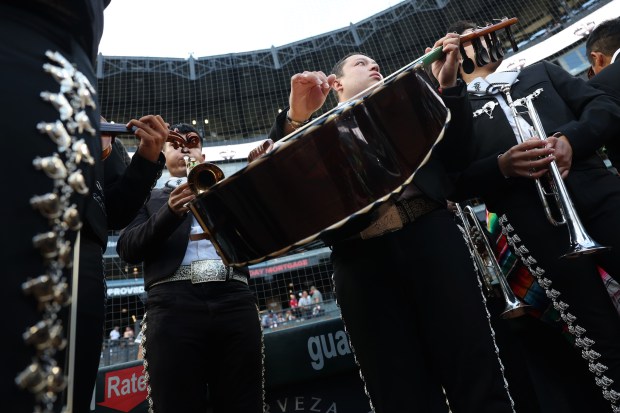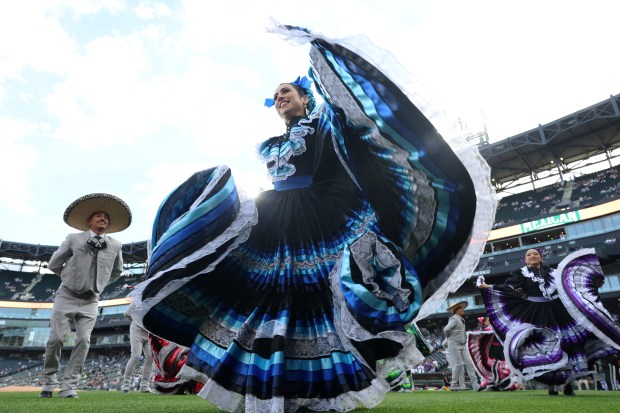The Chicago White Sox may not be having their best season, but their Mexican fans in Chicago are.
For the first time in the team’s 124-year history, the Sox held a Mexican Heritage Night during their game against the Los Angeles Dodgers last Wednesday at Guaranteed Rate Field.
It was also the team’s first sold-out game of the season, bringing nearly 40,000 people together during a night that perhaps had little to do with baseball and more to do with the strong presence of Mexicans in Chicago and their culture. It was the first weekday sellout that was not a crosstown series or home opener since July 23, 2012.
Live banda music, mariachi, charros and traditional folklore dancers adorned a game that authentically and vividly celebrated its Mexican fan base. For the Sox, the night was not about attracting more fans but rather honoring the support of loyal fans, mostly from the Southwest Side of Chicago, who support their team regardless of the standings.
My grandfather used to say, “Maybe the Sox are not the best team in Chicago, but they are the team of the people.”
“Son el equipo del pueblo,” he told me. The team of the people. And that’s the reason he considered himself a White Sox fan more than a Cubs fan.
I understood what he meant when I arrived at the stadium last Wednesday and heard the banda music echoing through the parking lot, where thousands of people cheered to some tequila with the scent of carne asada and tacos in the wind.
To be sure, not everyone was there to watch the baseball game; most were there because they wanted to experience community and belonging in a city where Mexican immigrants and people of Mexican descent are still underrepresented in society — politics, entertainment, the workforce — despite making up more than one-third of the population.
In Chicago, 1 in 5 residents are Mexican or have Mexican roots, according to the U.S. Census. The White Sox understand that. But they also understand the regions in Mexico they come from: Durango, Zacatecas, Jalisco, Guanajuato.
Though the White Sox have hosted Hispanic Heritage Night in the past, which is meant to recognize the Latino population in the city, the team has never ventured into celebrating a single Latin country before.
That was until their business analytics team noticed that 50% of the attendees at the annual Hispanic Heritage Night were fans of Mexican descent.
Sheena Quinn, a spokeswoman for the White Sox, said there has been steady growth every year among their Mexican fan base, consistently outperforming the league average.
For many of the Mexican fans, White Sox pride is generational. It is a family affair based on loyalty and humility.
I remember the first time my grandfather went to a Sox game at Guaranteed Rate Field in 2016. That was nearly 50 years after he arrived in Chicago from Guanajuato, Mexico. Though he loved baseball and yearned to go to a game, he couldn’t afford it, he’d say.
He considered it a luxury as a construction worker with 11 children and dozens of grandchildren.
So when he walked into the stadium, he was overwhelmed with emotion. He had waited decades for the moment and when he finally went to the game, some of his children and grandchildren joined him.
From that day on, they also became Sox fans.
When I found myself walking around the stadium on Mexican Heritage Night, I thought of my grandfather as I watched entire families enjoying the game together.

Josue Duarte, a lifelong Sox fan and a Chicago realtor, said he bought 100 tickets weeks in advance of the game for his friends, family and employees. Many drove from Aurora, Elgin and other nearby suburbs.
“I felt a sense of pride knowing that one of our major teams was recognizing the importance of our community,” Duarte said. “The fact that we filled the stadium to capacity shows not just our social influence but the economic power that we bring with it. Our people purchased sportswear, food, beverages and all products associated with enjoying a night at a game.”
He is certain, he said, “that the numbers show the strength of our economic power.”
The Mexican immigrant community in Chicago is perhaps the largest and oldest community of Latino immigrants in the Chicago area. It is now made up of first- and second-generation Mexicans who have moved from blue-collar jobs to white-collar jobs and are now able to afford things their parents or grandparents couldn’t when they first arrived in the country.
Hundreds documented their experiences at the game on social media.
“POV: You finally have the privilege of having “fun money” to enjoy luxuries,” wrote Viviana Arzate in a video she posted of the game. “I hope that the woman who was serving us drinks can one day have the opportunity to watch the game and not only serve others.”
Latinos, most of Mexican descent, have the highest labor force participation rate of any racial or ethnic group in the region. They represent the fastest-growing segment of spending power — a total of $68 billion in Illinois, according to a recent report by Latino Policy Forum, in conjunction with the Metropolitan Planning Council and the University of Illinois Chicago’s Great Cities Institute.
Sinhue Mendoza, a sports consultant based in Chicago, said unlike other local teams that have attempted to tap into the Mexican base, the White Sox “got it right.”
It was a dignified celebration that was not solely intended to sell tickets or attract fans, he said, noting that the Chicago Fire’s Mexican Heritage Night coincided with their larger Chicago Sports Night promotion in early April. The Cubs had a special ticket package offer in April that came with a Mexican-themed hat.
“They were not authentic,” he said.
Mendoza credited the success of the White Sox”s first Mexican Heritage Night to the Mexican-American staff, who were allowed to contribute their ideas and knowledge.
Whether a marketing strategy or not, Mexican Sox fans couldn’t tell the difference. Or perhaps they didn’t care because, as my grandpa said, “son el equipo del pueblo.”



